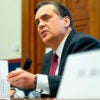President Joe Biden announced a new student loan forgiveness plan early Monday morning. But who qualifies for forgiveness? Will the president succeed with his efforts, or will the courts block this plan as they did with the last one?
Madison Marino, a senior research associate, in The Heritage Foundation’s Center for Education Policy, joins “The Daily Signal Podcast” afternoon edition to answer these questions.
Listen to the podcast below or read the lightly edited transcript:
Virginia Allen: What do we know right now about this student loan forgiveness plan? Who exactly is eligible?
Madison Marino: Yeah, we know that, you know, President Biden is today pitching kind of the new details of what he’s calling his Plan B on student loan mass cancellation in Madison, Wisconsin, today. What we know is, this is his second attempt at mass loan cancellation. Again, he’s doing it through regulation.
So, going around Congress with a proposed rule, probably that’s going to give us more details about what exactly the loan cancellation will entail over the next couple of weeks. So what we’re kind of thinking just based on the negotiated rulemaking that’s been happening over at the department, we’re expecting that with this new regulation the Education Secretary [Miguel] Cardona will be able to cancel debt for borrowers he expects to default because they’re experiencing hardship. Now, what is that hardship? We don’t know exactly. And then also the rule would allow for loan cancellation for those who have seen balances rise because of maybe accrued interest or those who have been paying for about 20 plus years.
Allen: That does sound very broad to say, canceling for those experiencing “hardship,” as I’m sure many people might say, I’m experiencing hardship, but on paper maybe they’re making a decent salary. So how do you think the Biden administration is going to define “hardship?”
Madison Marino: Absolutely. So, kind of what we’ve seen come out of the negotiated rulemaking committee is that the definition of hardship is very vague. Like you’ve, like you’ve mentioned, we’re thinking that it might include those who are Pell Grant recipients or those who are not able to, they were not able to finish their degree, which our concern is that together just those two factors would account for about 71% of college students nationwide. So, and it could maybe create even a perverse incentive to not pay back your loans if you weren’t, if you maybe were not able to finish a degree.
Allen: We saw, of course, with the last time the president tried to do mass student loan forgiveness that ultimately that plan failed and was blocked by the courts. What are we going to see with this, do you think a similar situation will play out?
Madison Marino: Yes, yes. So yeah, kind of what we’re thinking is that, you know, this is a major overstep of what he can do as president. He really does have no constitutional authority for mass cancellation. It’s being done without express congressional authorization. And so we’re thinking that, you know, just like the Supreme Court struck down his first initial plan on mass cancellation, we’re thinking that more lawsuits will follow once the rule comes out, probably in the next couple of weeks. And hopefully we’ll see a similar situation happen with the courts.
Allen: Madison, everyone can agree, whether Republican or Democrat, that we have a problem in regards to student loans. Now solutions vary, and opinions on those solutions vary, but what would you say, how do we address what ultimately has become a bit of a crisis where you have so many Americans with massive debt and so many Americans, young people, still going to college, taking out massive student loan debt. How do we stop this?
Madison Marino: Absolutely. So I think Congress really has the option to weigh in here. They’re the ones that address the higher cost of college. A massive loan cancellation like the Biden administration’s doing will only incentivize colleges to keep raising their tuition prices if they think the government, which is the American taxpayer, are going to be the ones that will pay for it ultimately. So, there’s several bills out there. The College Cost Reduction Act put together by Virginia Foxx, that House Education Workforce [Committee] chairwoman, is a great example of those that will potentially kind of lower the cost of higher education over the long term. So just really looking to Congress to see what they can do to and not the president and pursuing his massive loan cancellation.




























